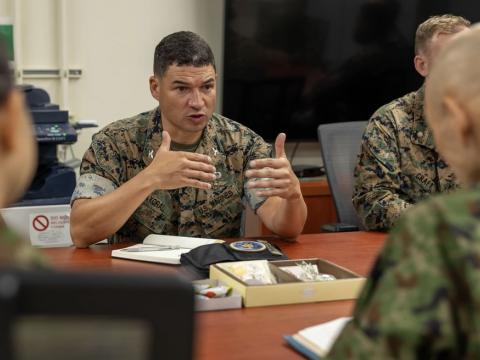Federal Agency and Industry Partnerships Help Expand Cyber Skill Sets
Government agencies are looking to educate their cyber workforce through continuous training, according to subject matter experts speaking at the 2025 Intelligence & National Security Summit at National Harbor, Maryland.
“We’re sending our people out to any kind of training that they can get. If we have the money for it, we’re sending you,” said Taushiana Bright, section chief for the cyber division at the FBI.
Bright also noted the FBI’s cyber kinetic range in Huntsville, Alabama, which involves training with foreign partners. The range includes mock locations and scenarios for realistic training. Additionally, it ensures adaptability with updated systems.
“Getting that feedback on a regular basis and keeping that dialog up allows us to create training environments that are going to equip our employees with the ability to address these threats,” Bright said.
The cyber expert also noted the importance of relationships with private and public sector partners, including Google and Microsoft.
Joining Bright on stage was Ronald Bushar, chief information security officer and managing director at Google Public Sector. Bushar echoed Bright’s statements and sang the FBI’s praises for its commitment to cyber training and public awareness.
Bushar spoke on his participation at the inaugural FBI-established CISO Academy, a now week-long training program. “It’s an amazing program, [and] I highly recommend it for anybody who’s a security executive,” he said.
The event also allows for an exchange of cybersecurity best practices between industry and law enforcement, Bushar added.
“I think that continued training and information exchange and those kinds of models is really an amazing opportunity, and it needs to continue and grow in my opinion, because it’s the only way we’re going to continue to have partnerships that really expand, build upon the joint perspective that we all have to work with,” he said.
Bright noted the FBI’s expansion of the program, now having 30 students and hosting the event twice a year. Additionally, the academy is looking to bring in in-house counsel for further education.
For the Cybersecurity and Infrastructure Security Agency (CISA), partnerships are paramount, noted Jermaine Roebuck, the agency’s associate director for threat hunting.
We’re sending our people out to any kind of training that they can get. If we have the money for it, we’re sending you.
Within the operational technology space, CISA has developed its Controlled Environment Laboratory resource, which is a miniature mock-up of industrial control systems—energy, water, wastewater, power and pipelines.
“Really what this allows us to do is bring folks in. You can detonate malware into those environments; it’ll give you real-world consequences,” he said. The initiative also allows participants to view the telemetry data to find the origins of an attack.
“It also allows us to do some training in terms of what types of remediation and mitigation plans do we need to mock up now and provide that out to the community in advance,” Roebuck explained. The program has also welcomed university students looking to gain expertise through real-world scenarios.
The National Guard is also looking to leverage exercises with non-military partners to ensure its cyber workforce is set up for success.
“Our civilian partners and our industry partners are part of this, and we’re now having numerous exercises that get at this environment here in the homeland and that in the future I think is going to contribute and pay dividends as we look at this mission space,” said Kenneth McNeill, chief information officer for the National Guard Bureau.
The 2025 Intelligence & National Security Summit is organized by AFCEA International and INSA. SIGNAL Media is the official media of AFCEA International.





Comments